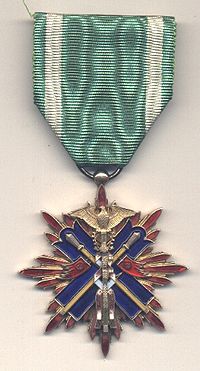Order of the Golden Kite
| Order of the Golden Kite | |
|---|---|

Order of the Golden Kite, 5th Class
|
|
| Awarded by the |
|
| Type | Seven-class military award |
| Eligibility | Military personnel only |
| Awarded for | Bravery, leadership or command in battle. |
| Campaign(s) |
First Sino-Japanese War Russo-Japanese War World War I Manchurian Incident Second Sino-Japanese War Pacific War |
| Status | No longer awarded; abolished in 1947 |
| Statistics | |
| Established | 12 February 1890 |
| First awarded | 1890 |
| Last awarded | 1945 |
| Total awarded | 1,067,492 |
|
Ribbon of the Order of the Golden Kite |
|
The Order of the Golden Kite (金鵄勲章 Kinshi Kunsho?) was an order of the Empire of Japan, established on 12 February 1890 by Emperor Meiji "in commemoration of Jimmu Tennō, the Romulus of Japan." It was officially abolished by the Supreme Commander of the Allied Powers of Occupied Japan in 1947 after World War II.
The Order of the Golden Kite was an exclusively military award, conferred for bravery, leadership or command in battle. It ranked just below the Order of the Chrysanthemum in precedence and was the military equivalent of the Order of the Paulownia Flowers; therefore, it could be considered analogous to the military division of the Order of the Bath in the United Kingdom. The first three classes were roughly equivalent to the three divisions of the Order of the Bath, the fourth, fifth, sixth and seventh classes were analogous to the DSO, MC/DSC, DCM/CGM and DSM/MM, respectively.
The order consisted of seven classes. Enlisted rank soldiers were eligible for the 7th - 5th classes, non-commissioned officers were eligible for the 6th - 4th classes, junior officers for the 5th - 3rd classes, field grade officers for the 4th-2nd classes and general officers for the 3rd-1st classes.
A total of 1,067,492 Order of the Golden Kite awards were made over the history of the order, most of them in the two lower 6th and 7th classes. Only 41 of the 1st class and 201 of the 2nd class were awarded.
By conflict:
The award came with an annual monetary stipend, fixed in 1916. This was awarded for the lifetime of the recipient, and following his death, it would be awarded to the recipient's family for one year after. If the recipient died within 5 years of receiving the honor, the stipend would be awarded to the family until the end of the 5-year period. In 1939, the stipends stood as follows:
...
Wikipedia
